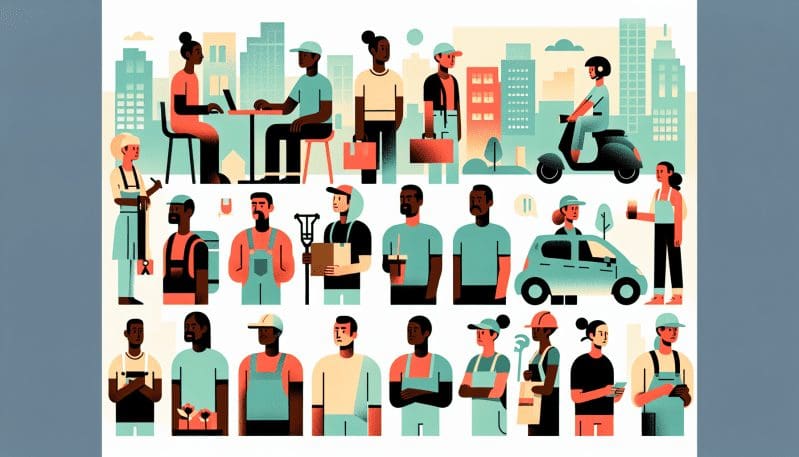In recent years, the gig economy has ballooned into a formidable force, with millions of workers worldwide accepting short-term contracts or freelance work as their primary source of income. Platforms like Uber, Upwork, and Airbnb exemplify this seismic shift in our understanding of employment, offering unparalleled flexibility but also a new set of challenges. As we stand at the crossroads of labor transformation, The Work Times probes the depths of the gig economy and questions its viability as a sustainable employment model for the future workforce.
The Psychological and Financial Impacts of Gig Work
The allure of gig work often lies in its promise of freedom—select your hours, choose your projects, and be your own boss. But this independence comes at a cost. The burden of constant job hunting can lead to psychological stress and financial instability for many. Without the predictable income of traditional employment, gig workers must navigate unpredictable pay and a lack of benefits, which can result in anxiety and an inability to plan for long-term financial goals. Studies have shown that the uncertainty associated with gig work can exacerbate mental health issues like depression and anxiety.
The Consequences of Eroding Job Security and Benefits
Traditional job security and benefits are foundational to employees’ long-term prosperity. Health insurance, retirement plans, paid leave, and worker’s compensation are critical safety nets that are often inaccessible to gig workers. The absence of these benefits not only affects workers’ immediate health and well-being but also raises concerns about their long-term financial health and stability. As more people turn to gig work, a growing portion of the labor force may find themselves without adequate retirement savings or healthcare coverage.
Industry Adaptation and Resistance to the Gig Economy
Different sectors are responding to the surge of gig work in various ways. While technology and creative industries appear more amenable to incorporating freelancers into their business models, other sectors remain resistant due to regulatory challenges or the inherent nature of the work, which may require long-term commitments and deeper institutional knowledge. In the gig economy, businesses save costs by not providing employee benefits, but they also risk losing the loyalty and accumulated expertise that traditionally employed workers offer.
Wider Economic Implications for Job Markets Dominated by Gig Work
The proliferation of gig work has significant implications for the larger economy. It challenges the traditional employer-employee relationship, blurs lines between personal and professional lives, and shifts economic risks from companies to individuals. Moreover, as gig work becomes a staple in job markets, it may contribute to wage stagnation and increase income inequality. While some individuals thrive as freelancers, many may struggle without the protections and collective bargaining power that traditional employment provides.
Personal Narratives and Expert Analyses
Behind the statistics and economic predictions are the lived experiences of millions of gig workers. Their stories shed light on the nuanced realities of gig work—some enjoy the autonomy and variety, while others grapple with the precarious nature of their employment. Economists and labor market experts emphasize the need for policy interventions to ensure gig workers have access to social security benefits and protections that reflect the changing nature of work.
In Conclusion
The gig economy is not a monolithic entity; it is a mosaic of experiences, sectors, and outcomes. Its sustainability as a dominant form of employment depends on our willingness to reform systems and create new paradigms that safeguard the well-being of workers in this fragmented landscape. As the gig economy continues to evolve, The Work Times remains dedicated to unraveling its complexities and implications for the future of work.
For informed readers seeking a critical examination of contemporary labor issues, The Work Times offers an indispensable perspective on the gig economy, resonating with the analytical depth found in publications like the Washington Post, The New Yorker, and The New York Times. The future of work is unfolding before us, and it is imperative we understand its many dimensions.




























